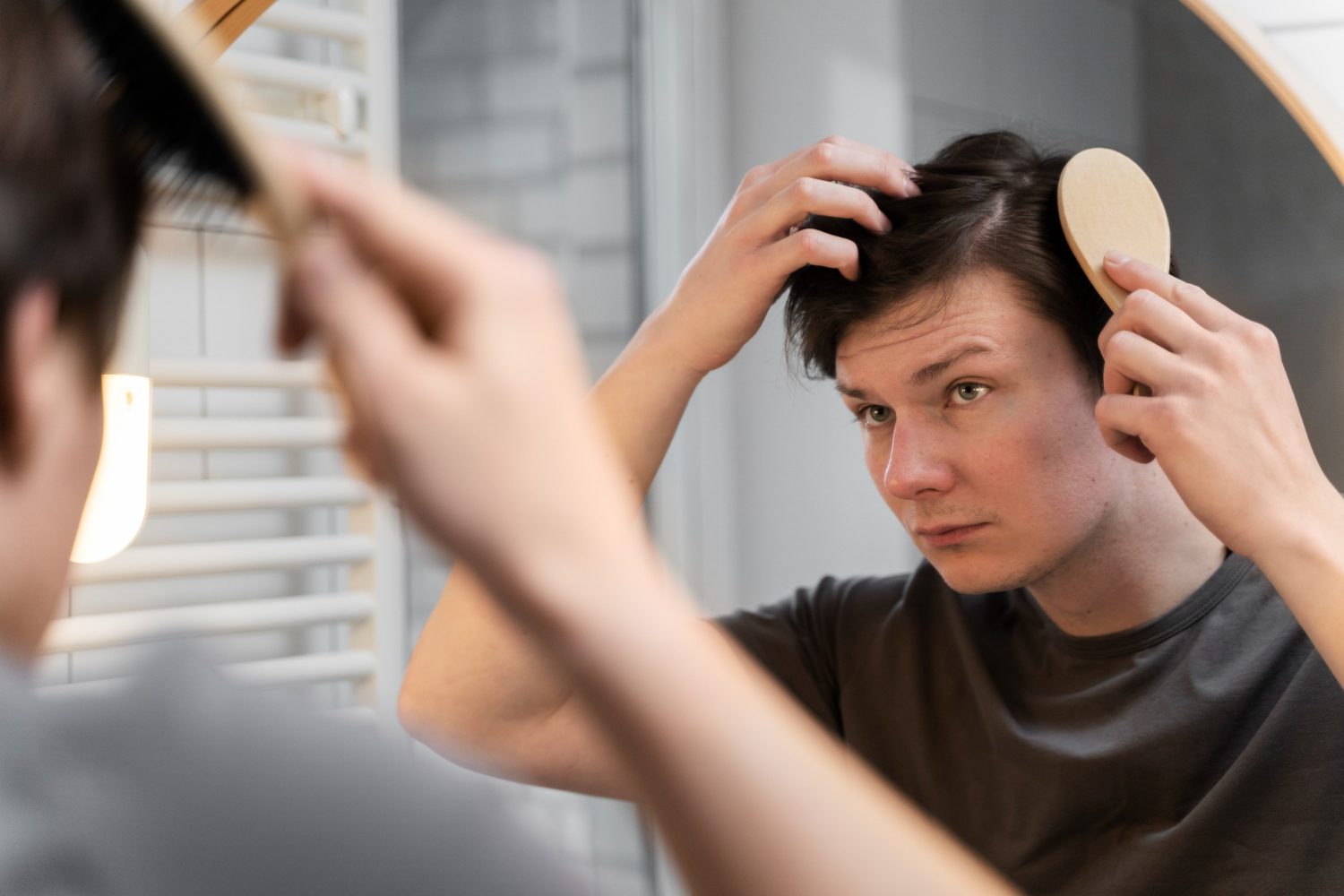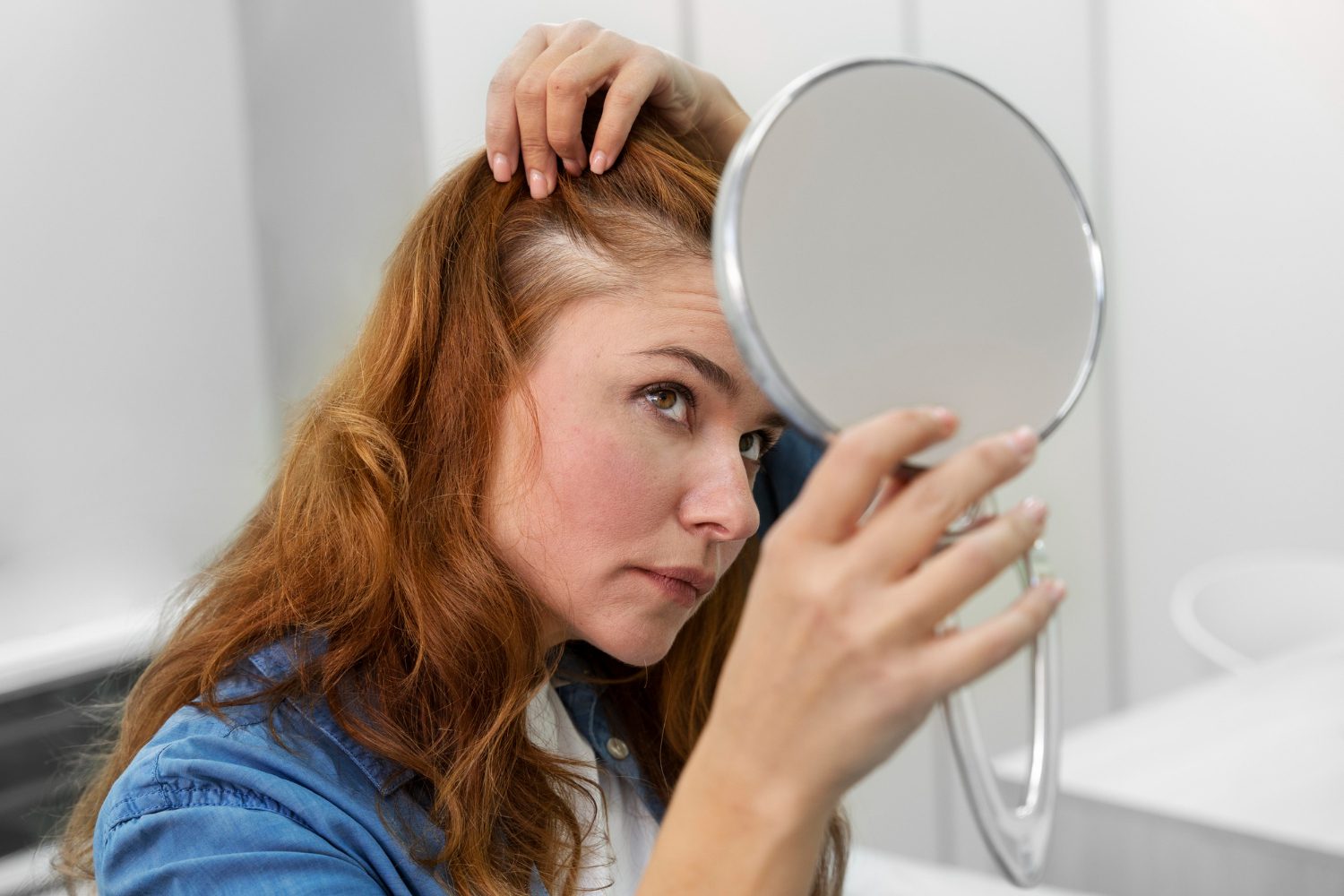
Does Testosterone Cause Hair Loss ? The Truth You Need to Know
admin
- 0
- 6
Testosterone does not directly cause hair loss, but it can contribute to it in individuals who are genetically prone to male pattern baldness. Hair loss occurs when hair follicles are sensitive to the hormone dihydrotestosterone (dht), which is derived from testosterone.
In susceptible individuals, dht binds to receptors in the scalp, causing miniaturization of the hair follicles, leading to thinner and shorter hair strands eventually. Although testosterone itself does not directly cause hair loss, high levels of it can lead to an increase in dht production, which can exacerbate hair loss in those with a genetic predisposition.
It’s important to note that not everyone with high testosterone levels will experience hair loss, as genetic factors play a significant role in determining susceptibility.

Table of Contents
ToggleUnderstanding Testosterone And Its Role In Hair Growth
Testosterone is a hormone that plays a crucial role in numerous bodily functions, including hair growth. Many people wonder if testosterone causes hair loss or contributes to it. In this section, we will delve into the relationship between testosterone and hair growth to gain a deeper understanding of how this hormone affects our locks.
What Is Testosterone?
- Testosterone is a sex hormone predominantly found in males, but it is also present in females at lower levels.
- It is primarily produced in the testes in men and in the ovaries and adrenal glands in women.
- Testosterone is responsible for the development of male characteristics such as deepening of the voice, muscle growth, and the growth of facial and body hair.
How Does Testosterone Affect Hair Growth?
- Testosterone promotes hair growth by stimulating the hair follicles to produce thicker and longer hair.
- During puberty, increased levels of testosterone contribute to the development of body and facial hair.
- Testosterone also influences the distribution of hair on the body, determining where hair grows and how thick it becomes.
The Link Between Testosterone And Hair Loss
- Hair loss can occur when the hormone dihydrotestosterone (dht) is produced from testosterone by the enzyme 5-alpha reductase.
- Dht binds to receptors in the hair follicles, causing them to shrink and eventually leading to miniaturization of the hair.
- When the hair follicles become miniaturized, they produce shorter, thinner strands of hair until they can no longer grow hair at all.
- This process is often referred to as male pattern baldness, and it primarily affects the hair on the scalp, but it can also impact other areas of the body.
Debunking Common Misconceptions About Testosterone And Hair Loss
- Contrary to popular belief, testosterone alone does not directly cause hair loss. It is the conversion of testosterone into dht that is responsible for hair loss.
- It’s important to note that hair loss is a complex issue influenced by multiple factors, including genetics, hormones, and age.
- Therefore, blaming testosterone alone for hair loss oversimplifies the situation and disregards other contributing factors.
- Understanding the role of dht and its interaction with hair follicles can help us better comprehend the complexities of hair loss.
By unraveling the relationship between testosterone and hair growth, we can comprehend that while testosterone plays a vital role in hair growth, it is the conversion of testosterone into dht that contributes to hair loss. This understanding debunks common misconceptions and highlights the multifaceted nature of hair loss.
So, next time you hear someone blaming testosterone, you can confidently explain the true intricacies behind this process.
Genetic Factors And Hormonal Imbalance: The Real Causes Of Hair Loss
Hair loss is a common concern for both men and women, and testosterone is often blamed as the culprit behind this frustrating condition. However, the relationship between testosterone and hair loss is not as straightforward as it seems. It’s important to delve deeper into the genetic factors and hormonal imbalances that play a significant role in hair loss.
By understanding these underlying causes, we can gain a clearer perspective on the impact of testosterone on hair loss and how other hormones contribute to this process. Let’s explore these factors in more detail.
Genetic Factors And Their Impact On Hair Loss
- Family history: Genetic factors have a substantial influence on hair loss, with a strong familial pattern often seen.
- Androgenetic alopecia: This is the most common type of hair loss in both men and women and is believed to be primarily caused by genetic factors.
- Inheritance: Hair loss can be inherited from either side of the family, and the genes involved interact with hormones to determine the pattern and severity of hair loss.
- Sensitivity to hormones: Genetic variations can make some individuals more sensitive to the hormone dihydrotestosterone (dht), leading to hair follicle miniaturization and eventual hair loss.
The Role Of Hormonal Imbalance In Hair Loss
- Balance is key: Hormonal imbalance can disrupt the normal hair growth cycle and contribute to hair loss.
- Androgens and estrogens: The levels of hormones like testosterone, dht, and estrogen play a crucial role in maintaining healthy hair growth.
- Imbalance triggers: Conditions such as polycystic ovary syndrome (pcos) and certain medications can disrupt hormone levels and contribute to hair loss.
- Thyroid dysfunction: An underactive or overactive thyroid can disrupt hormone levels, leading to hair loss as a secondary symptom.
Exploring The Relationship Between Testosterone And Hair Loss
- Testosterone’s role: Testosterone is a hormone commonly associated with masculinity and is often blamed for hair loss due to its conversion to dht.
- Dht effect: Dht is a more potent form of testosterone and has been linked to hair follicle miniaturization, leading to hair loss in individuals with genetic sensitivity.
- Hair follicle sensitivity: Genetic predisposition determines the sensitivity of hair follicles to dht, with some individuals experiencing more severe hair loss than others.
How Other Hormones Contribute To Hair Loss
- Estrogen and hair growth: Estrogen, predominantly found in women, helps maintain hair growth and prolongs the growth phase of hair follicles.
- Hormonal changes: Fluctuations in estrogen levels during pregnancy, menopause, or hormone replacement therapy can disrupt the hair growth cycle and lead to hair loss.
- Cortisol and stress: Chronic stress can lead to an increase in cortisol levels, which can disrupt hormone balance, including testosterone levels, potentially contributing to hair loss.
Understanding the complex interplay between genetic factors and hormonal imbalances is crucial when discussing the relationship between testosterone and hair loss. While testosterone and its conversion to dht can play a role in hair loss, it is not the sole factor responsible.
By considering the broader context of genetic factors and hormonal imbalances, we can gain a deeper understanding of the multifactorial nature of hair loss.
The Role Of Dht: Testosterone’S Troublesome Byproduct
Testosterone, the primary male sex hormone, plays a crucial role in various bodily functions. It promotes muscle growth, regulates bone density, and influences mood and libido. However, one of the concerns often associated with testosterone is its potential to cause hair loss.
But is testosterone alone to blame? The answer lies in dihydrotestosterone (dht), a metabolite of testosterone that is responsible for triggering hair loss in specific individuals.
What Is Dht And How Is It Related To Testosterone?
Dht, or dihydrotestosterone, is a hormone produced in the body through the conversion of testosterone by an enzyme called 5-alpha-reductase. This conversion primarily occurs in certain tissues, including the scalp. Dht is more potent than testosterone and has a greater affinity for androgen receptors in the hair follicles.
The Impact Of Dht On Hair Follicles
Dht has a detrimental effect on hair follicles in individuals with a genetic predisposition to hair loss. It binds to the androgen receptors in the hair follicles, particularly those located in the temples and crown of the head. This binding shrinks the hair follicles, making them gradually produce finer, thinner hair.
Over time, these weakened follicles may become unable to produce visible hair, leading to the characteristic signs of hair loss.
Understanding The Mechanism Of Hair Loss Caused By Dht
The miniaturization of hair follicles caused by dht is a progressive process. As dht attaches to the androgen receptors, it triggers a chain of events that weaken the hair follicles. This weakens the hair shaft, reducing its growth phase, known as anagen.
As a result, the hair follicles spend more time in the resting phase, known as telogen, leading to shorter and finer hair strands. Ultimately, the follicles may enter a state of dormancy, resulting in the absence of visible hair growth.
How Dht Affects The Hair Growth Cycle
To fully grasp the impact of dht on hair loss, it’s important to understand the hair growth cycle. The hair growth cycle consists of three phases: anagen (growth phase), catagen (transitional phase), and telogen (resting phase). Dht disrupts this cycle by shortening the anagen phase, leading to shorter and finer hair.
Additionally, dht can extend the telogen phase, causing hair to shed more rapidly. This combination of shorter growth cycles and increased shedding contributes to the gradual thinning and eventual loss of hair.
While testosterone itself is not directly responsible for hair loss, its conversion to dht can have a significant impact. Dht’s interaction with androgen receptors in the hair follicles leads to their miniaturization and a disruption of the hair growth cycle.
Understanding the role of dht can help individuals better comprehend the mechanisms behind hair loss and explore potential solutions to mitigate its effects.
Limiting Testosterone-Related Hair Loss: Prevention And Treatment Options
Testosterone, the primary male sex hormone, plays a crucial role in various bodily functions. However, it is often associated with hair loss. While it’s true that testosterone can contribute to hair loss, it’s not the sole culprit. There are several ways to limit testosterone-related hair loss and promote healthier hair.
In this section, we’ll explore lifestyle changes, dietary modifications, topical treatments, medical interventions, and the role of hair transplant surgery in managing testosterone-induced hair loss.
Lifestyle Changes To Manage Testosterone Levels:
- Regular exercise: Engaging in physical activities can help regulate testosterone levels and promote overall well-being.
- Stress management: High levels of stress can increase testosterone production, leading to hair loss. Employ stress reduction techniques such as mindfulness exercises, meditation, or therapy.
- Adequate sleep: Getting enough quality sleep is crucial as lack of sleep can disrupt hormone balance, including testosterone.
Dietary Modifications For Healthier Hair:
- Balanced diet: Ensure your diet is rich in essential nutrients like vitamins (a, b, c, d, and e), minerals (such as iron, zinc, and selenium), and proteins.
- Omega-3 fatty acids: Incorporate fatty fish (salmon, mackerel), chia seeds, flaxseeds, and walnuts into your diet to nourish your hair follicles.
- Limit processed foods: High consumption of processed foods, sugary snacks, and beverages can lead to imbalances in hormone levels, including testosterone.
Topical Treatments To Combat Testosterone-Induced Hair Loss:
- Minoxidil: This fda-approved topical treatment can help stimulate hair growth and slow down hair loss caused by testosterone.
- Finasteride: A prescription medication that blocks the conversion of testosterone into dihydrotestosterone (dht), the hormone responsible for hair loss.
Medical Interventions And Their Effectiveness:
- Platelet-rich plasma (prp) therapy: Platelets containing growth factors are injected into the scalp, promoting hair growth and reducing hair loss.
- Low-level laser therapy (lllt): This non-invasive treatment uses red light therapy to stimulate the hair follicles, improving hair density and regrowth.
- Hormone replacement therapy (hrt): In cases where hormonal imbalances contribute to hair loss, hrt can help restore testosterone levels.
The Role Of Hair Transplant Surgery In Treating Testosterone-Related Hair Loss:
- Hair transplant surgery involves grafting healthy hair follicles from the back or sides of the scalp to the balding areas. It provides a permanent solution for testosterone-related hair loss.
- Modern transplant techniques such as follicular unit extraction (fue) and follicular unit transplantation (fut) ensure natural-looking results.
By implementing lifestyle changes, modifying your diet, exploring topical treatments, considering medical interventions, and possibly opting for hair transplant surgery, you can effectively manage testosterone-related hair loss. Consulting with a healthcare professional or a hair restoration specialist will help you choose the most appropriate options based on your individual needs and circumstances.
Remember, managing testosterone-induced hair loss is a multifaceted journey that requires a comprehensive approach.
Frequently Asked Questions For Does Testosterone Cause Hair Loss
Does Testosterone Cause Hair Loss In Men?
Testosterone alone does not directly cause hair loss in men. However, if you have a genetic predisposition to male pattern baldness, high levels of testosterone can accelerate the process. It’s usually the conversion of testosterone to dihydrotestosterone (dht) that affects hair follicles and leads to hair loss.
Can Testosterone Replacement Therapy Lead To Hair Loss?
Testosterone replacement therapy (trt) can potentially lead to hair loss in certain individuals. If you are genetically predisposed to male pattern baldness, trt can increase the production of dht, which can then cause hair follicles to shrink and eventually cease producing hair.
However, not everyone will experience hair loss with trt.
Is There Any Way To Prevent Testosterone-Induced Hair Loss?
While you cannot completely prevent testosterone-induced hair loss, you can manage it. Effective options include medications like finasteride or dutasteride, which reduce the conversion of testosterone to dht, or minoxidil, which promotes hair growth. Consulting with a healthcare professional can help determine the most suitable approach for your specific situation.
Conclusion
Understanding the relationship between testosterone and hair loss is a complex and nuanced topic. While it is true that higher levels of testosterone can contribute to hair loss in some individuals, it is important to recognize that genetics and overall health also play crucial roles.
It is not solely the presence of testosterone that determines one’s susceptibility to hair loss. Additionally, it is essential to consult with a medical professional who can provide accurate diagnosis and customized treatment options. Addressing hair loss concerns requires a holistic approach, considering nutritional factors, stress levels, and lifestyle choices.
By establishing a balanced understanding of testosterone’s impact on hair health, individuals can make informed decisions about their well-being. Empowering ourselves with knowledge not only helps us navigate potential hair loss issues, but also encourages an overall healthier lifestyle.



